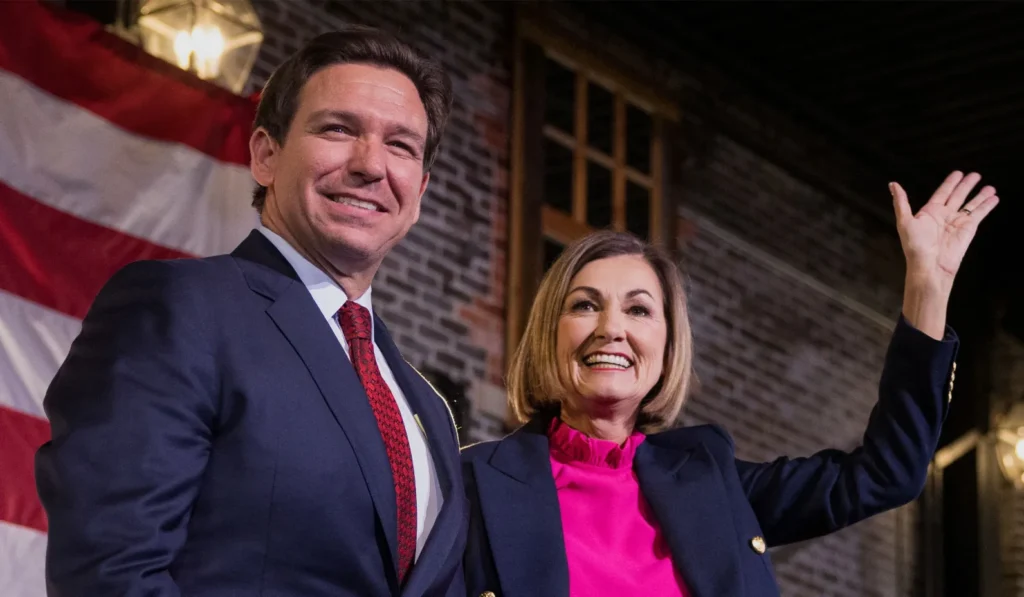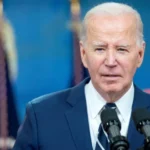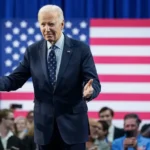
Published November 10, 2023
Ron DeSantis’s campaign is touting Iowa governor Kim Reynolds’s recent endorsement as a sign it’s gaining strength. Critics will contest this, noting that DeSantis remains well behind former president Donald Trump in all polls. That’s true, but it’s also true that Iowa voters have a pattern of deciding very late in the campaign. If Reynolds’s endorsement is followed up with strong contrasts with Trump that attract religious and establishment voters, DeSantis might yet have a chance.
Iowa’s habit of late breaks is clear and distinct. In early December 2003, John Kerry and John Edwards were running in third and fourth place, with 9 percent and 5 percent, respectively. Six weeks later, they finished one-two with 37 and 33 percent. That’s a stunning turnaround in a very short time.
Republican voters also tend to move shortly before the caucuses. Rick Santorum soared in just a week from a bit under 8 percent in polls on December 27 to 16 percent the day before the January 3 caucus. Even that dramatically understated his support: He garnered almost 25 percent on caucus day, edging out Mitt Romney for the win.
The 2016 caucus was no exception. Both Ted Cruz and Marco Rubio were polling around 13 percent in mid November, trailing Ben Carson and Donald Trump. Cruz skyrocketed during December, moving from 12.5 to over 30 percent in just four weeks. Rubio had a late surge too, moving from 11 percent on January 23 to almost 17 percent one week later. Like Santorum, Rubio received much more than his final polling average, getting 23 percent on caucus night to almost edge Trump out for second place.
It’s clear, then, that voters can move sharply toward a candidate in the final weeks before caucus night. The question is whether DeSantis can be the person, and what he has to do between now and then to make it happen.
Reynolds’s endorsement is a good start. She is popular with establishment Republicans for her tax cuts and with Evangelicals for signing school-choice and pro-life legislation. She is thus one person with credibility who cuts across the typical intraparty dividing lines. People from all campaigns told me when I visited Iowa in late July that her endorsement was the only one that could swing a few percent of the vote to her choice. If that’s right, we should see that in polls soon.
A few percent, however, won’t be enough for DeSantis. He doesn’t need to win Iowa, but he does need to hold Trump to at least an unimpressive win while also leading every other contender by a large margin. Getting 30 percent of the vote should do the trick. The problem is that he’s now sitting at 17 percent in the RealClearPolitics polling average. Reynolds could get him to 20 percent, but he’ll have to get the final ten points on his own.
Focusing on Iowa’s Evangelical community has to be the first job for the DeSantis campaign. They are the group that has tended to break late in the last few GOP caucuses, and they have ample reason to leave Trump behind. Trump has credibility with them for picking the justices who overturned Roe v. Wade, but he has recently signaled he’ll abandon them to court centrist voters on abortion. DeSantis — or better yet, his Evangelical surrogates — need to sharply ask Evangelical voters what they care more about: saving babies or saving Trump.
If that succeeds, DeSantis should get within striking range of the 30 percent mark. He then needs to deliver his own sharp contrasts with Trump on issues such as Trump’s tacit support for Covid lockdowns and extensive mail balloting. The specific issues are less important than the overall charge of weakness: When the going gets tough, Trump often backs down. DeSantis, on the other hand, will argue — as his super PAC’s name states — that he will never back down.
Again, he doesn’t have to knock Trump out. He just needs to show he’s a formidable competitor, that he can stay in the ring with the GOP’s toughest brawler, and trounce everyone else. Suppose the results show Trump with 37 percent, DeSantis with 30, Haley with 15, and 18 percent split among the field. That clearly shows it’s a two-person race, which would give DeSantis wind at his back as he heads to New Hampshire and beyond.
Haley and the others are also angling to become this year’s Iowa Cyclone. The Reynolds endorsement, though, might just be the blast of warm air that will set Iowa’s GOP winds in motion for DeSantis.
Henry Olsen, a senior fellow at the Ethics and Public Policy Center, studies and provides commentary on American politics. His work focuses on how America’s political order is being upended by populist challenges, from the left and the right. He also studies populism’s impact in other democracies in the developed world.











